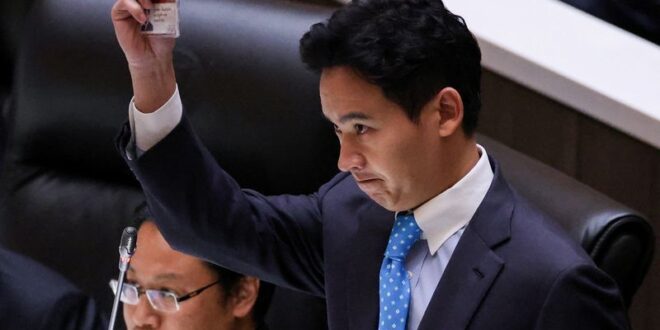BANGKOK (Reuters) – A Thai court will on Wednesday rule on whether former prime ministerial hopeful Pita Limjaroenrat broke the rules of a 2023 election won by his party, the first of two cases targeting an opposition that has threatened radical reforms to the country.
The Harvard-educated Pita, whose bid to become premier was thwarted by lawmakers allied with the royalist military, is accused of holding shares in a media company in violation of election law and could lose his parliamentary seat.
Pita has argued before the Constitutional Court that the firm’s loss of its broadcast concession in 2007 meant it cannot be considered a mass media organisation.
His anti-establishment Move Forward Party were the surprise winners of last year’s election, courting young and urban voters with its bold agenda to tackle business monopolies and reform a law that punishes insults of the monarchy with long prison terms.
The same court will next week decide whether Move Forward’s plan to amend that law was unconstitutional and tantamount to an attempt to “overthrow the democratic regime of government with the king as the head of state”.
If found guilty, Move Forward would be ordered to cease its controversial push to change the law, under which more than 200 people have been prosecuted since 2020, including a man facing a record 50 years of prison time.
The two cases, brought by conservative politicians, are part of a two-decade battle for power in Thailand that broadly pits a nexus of royalists, military and old money families against parties elected on populist or progressive platforms.
Despite being in opposition, Move Forward remains a threat to the status quo, maintaining appeal among liberal voters through its charismatic politicians and creative use of social media.
An opinion poll last month by the National Institute of Development Administration showed Pita, 43, was Thailand’s most popular politician for 39% of respondents, with Prime Minister Srettha Thavisin at 22%.
But Move Forward’s supporters fear unfavorable rulings this month could lead to more serious legal moves to stifle the party, including pursuit of criminal charges against Pita over his shareholding, party dissolution and lengthy political bans for its executives.
Move Forward’s predecessor, Future Forward, was on the wrong end of two Constitutional Court rulings from 2019 to 2020, with then leader and prime minister candidate Thanathorn Juangroongruangkit disqualified, also over a shareholding violation, and the party disbanded for breaching campaign funding rules.
(Reporting by Panu Wongcha-um; Editing by Martin Petty)
 BeritaKini.biz Berita Viral Terkini di Malaysia
BeritaKini.biz Berita Viral Terkini di Malaysia





